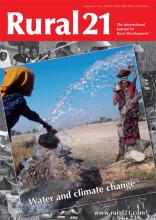Land Library
Welcome to the Land Portal Library. Explore our vast collection of open-access resources (over 74,000) including reports, journal articles, research papers, peer-reviewed publications, legal documents, videos and much more.
/ library resources
Showing items 280 through 288 of 354.Poverty in rural households have deepened in the past two years through world events: unprecedented rises in food and fuel prices were followed by global economic meltdown, all amidst growing climate uncertainty.
Water is scarce in India's semiarid zones of Rajasthan. Climate change is putting additional pressure on the rare resources. Irregular or no rainfall forces many small farmers to abandon their fields, at least temporarily, and seek work in the towns.
Many adaptation measures urgently needed in agriculture today as a consequence of climate change concern water in agriculture and were already devised and implemented in the 1980s as a part of rural development activities. However, most of the experience and knowledge have sunk without trace.
The world food crisis has spurred foreign direct investments (FDI) into arable land in developing countries. While significant financial inflows into agricultural sectors could be beneficial on a global scale, it could negatively affect local livelihoods.
In Germany, the debate about the security/development nexus is gathering pace.
A team of German and Spanish scientists has genetically modified a maize plant in a way that markedly increases the level of three vitamins in the maize kernels.
The early development strategies of both China and India were urban- and industry-focused, discounting the importance of rural development. Despite sweeping reforms in both countries, the urban bias and subsequent spatial disparities still exist today.
Kenya is still largely agrarian with 80 percent of its population depending on agriculture for food, employment and income. The dilemma facing the country is that only 20 percent of the land is suited for agricultural production.
Development assistance is contingent upon the efficiency and effectiveness of delivery mechanisms. EU regional policy offers an appealing paradigm of how to achieve tangible outcomes with sound financial management


